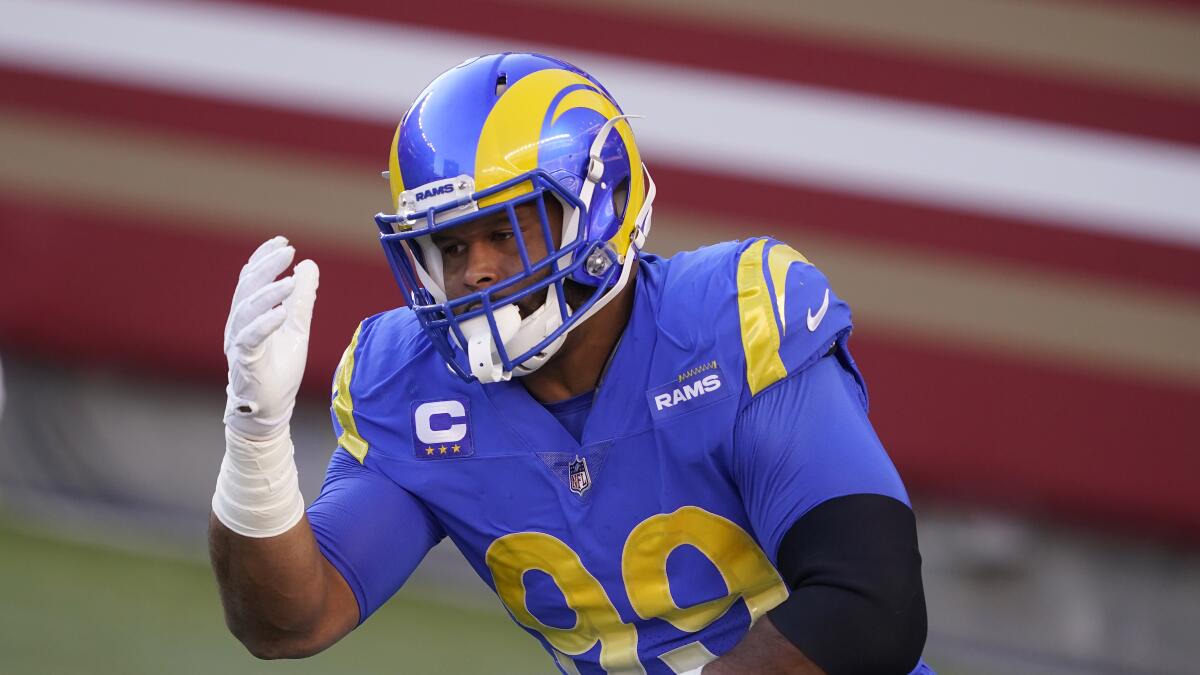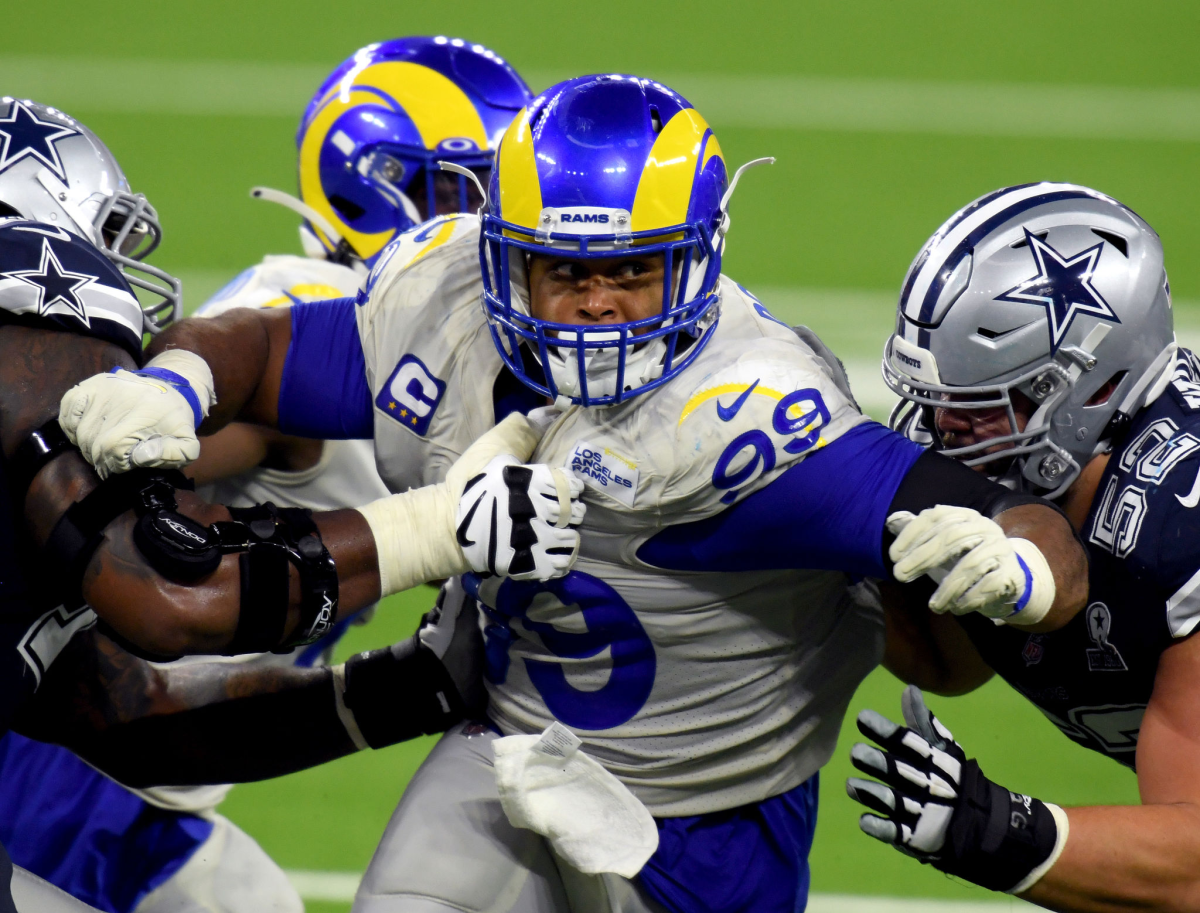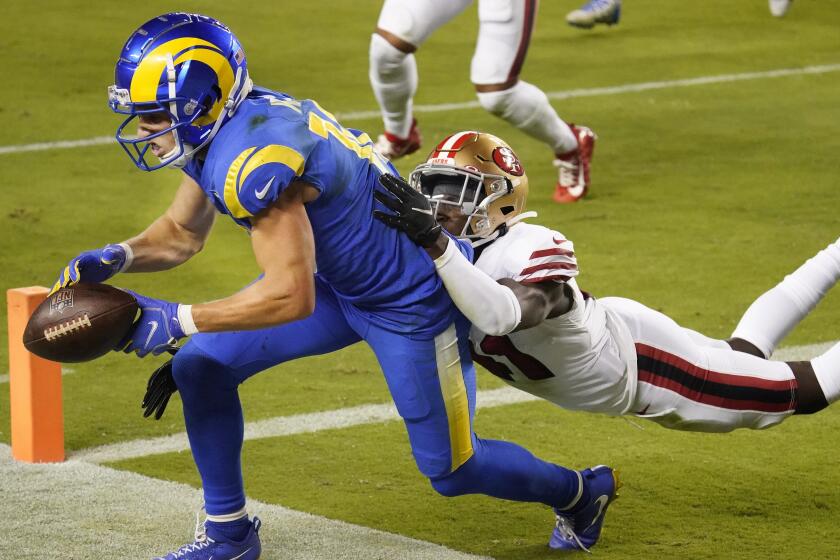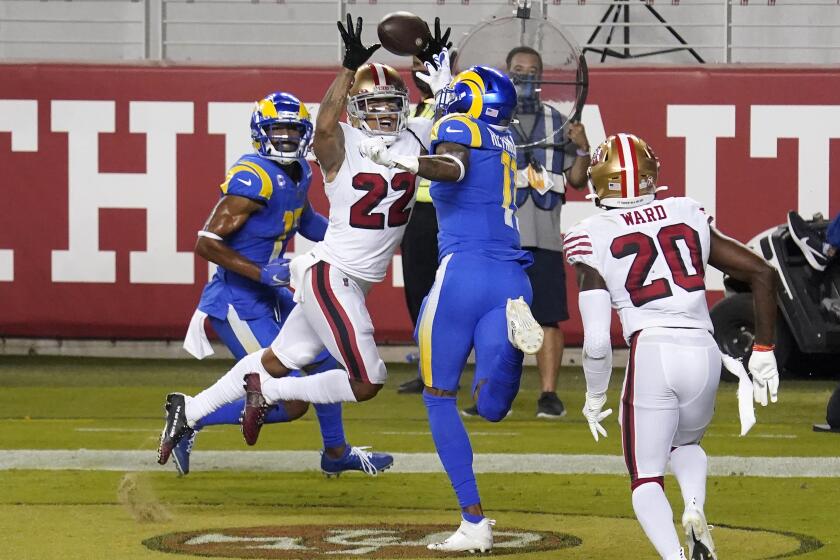Rams’ Aaron Donald is double trouble for offenses, but 49ers had his number

- Share via
To double team or not to double team Aaron Donald?
That is the question offensive coordinators must ask themselves ahead of matchups with the Rams and their star defensive tackle.
Despite the attention, Donald has accumulated 7½ sacks through six games, which ranks first in the NFL.
And those double teams are creating one-on-one scenarios for others on the defensive front. The Rams have 20 sacks, fifth most in the NFL. In back-to-back games against the New York Giants and Washington they accumulated 13 sacks.
But that trend ended abruptly Sunday in a 24-16 loss at San Francisco, as the 49ers didn’t allow a sack.
It remains to be seen if the 49ers provided a template for other teams to follow, or if it was just a bad night for the Rams in their NFC West opener.
Donald and the Rams defense still can put opposing coaches in a tricky situation, said Geoff Schwartz, who played offensive guard for eight NFL seasons and now works as an analyst for Sirius XM radio and foxsports.com.
“They’re just a tough matchup,” Schwartz said.
Jared Goff and Cooper Kupp struggled to connect on potential game-changing passes in the Rams’ 24-16 loss to the San Francisco 49ers.
Each week, opposing coaches find new ways to describe Donald.
Buffalo Bills offensive coordinator Brian Daboll jokingly said he hoped that Donald missed the bus to the stadium.
Washington coach Ron Rivera said he’s “special.”
49ers coach Kyle Shanahan called him a “problem.”
Before the 49ers neutralized Donald, efforts to stop him were not working.
Rams defensive coordinator Brandon Staley has a history of working with elite pass rushers. Before he joined the Rams’ staff, he coached Khalil Mack with the Chicago Bears and Von Miller with the Denver Broncos.
Staley knows offenses center their strategy around Donald, but preparation goes both ways.
“We’re game planning too,” he said. “We do a lot of things to think about Aaron Donald, and we have a lot of anticipation of how guys on the other side are going to try and game plan for him.”
Much of that plan includes shifting Donald along the line of scrimmage and rotating in different linemen to keep players fresh.
Donald plays about 85% of the defensive snaps per game, most among the Rams linemen. Michael Brockers, who has two sacks, averages 62%.
Staley infuses others into the pass-rushing mix. Inside linebacker Troy Reeder has three sacks and lineman Morgan Fox and outside linebacker Leonard Floyd two, and linebackers Jachai Polite (one), Justin Hollins (one), Obo Okoronkwo (one) and Samson Ebukam (half) also have contributed.
“We have a good group that’s been having success and finding ways to get to the quarterback, even when I’m not,” Donald said before the 49ers game. “If they want to pay attention to one guy more than another, then that guy is going to take advantage of his opportunities and win.”
Said rookie Terrell Lewis: “The more they try to double team him, the more that gives us an opportunity to make plays and benefit off the fact that we have such a big presence on the interior.”
Coach Sean McVay compared the defensive-front rotation to how basketball teams substitute. Staley said the changes disrupt offenses.
“Sometimes when you have to block a different guy, that just changes the pace on an offensive lineman,” Staley said, adding that depth makes the pass rush stronger late in games. “I think the more depth you have, the more you can isolate match-ups, kind of the game within the game.”
Donald, a six-time Pro Bowl selection and two-time defensive player of the year, is a natural “three technique,” meaning he’d usually hover over the offensive guard’s shoulder. But Staley rotates Donald in his hybrid 3-4 scheme. At times, Donald acts as an end, lining up on the shoulder of the outside lineman.

Schwartz said Donald’s movement reminds him of Houston Texans end J.J. Watt, a three-time defensive player of the year. As with Watt, Donald moves along the line of scrimmage, picking the weakest blocker to attack. It makes the already daunting task of facing Donald even tougher, Schwartz said.
“When you move him around that much, you can’t pinpoint where to double team him,” he said. “If one play he’s over the right guard, then the next play he’s over the left tackle, you can’t set your offense up. Moving him around just screws with your protection.”
The key to Donald’s success, Schwartz said, is his ability to keep his pad level low while using his hands aggressively after a quick “get-off” when the ball is snapped. He is too elusive for most offensive linemen to handle without help.
McVay said he’s seen “some of the most creative protection alignments” to stop Donald, including running backs assisting in blocking assignments and much of the offensive line shifting to Donald’s side.
But those tactics still might not work.
The Bills double teamed Donald on approximately 52% of the snaps, according to a Times review of film. He still accumulated two sacks, and attracted a triple team that helped him set up a sack by Floyd.
Washington double teamed Donald on approximately 53% of his snaps. He still produced four sacks for the second time in six-plus seasons.
But that type of production was absent against the 49ers, who took an early lead and relied on a running attack full of pre-snap motion and misdirection.
The Rams won four games against the feeble NFC East, but a loss at San Francisco reminds them that the NFC West is going to be a difficult division to tackle.
When they passed, 49ers quarterback Jimmy Garoppolo released the ball quickly, with an average time of just 2.38 seconds, according to Next Gen Stats, a widely used analytical database. Garoppolo praised his offensive line for protecting him, saying he had clean pocket and the Rams “didn’t get near me.”
“They never had to get into many situations where they had to pass it a lot,” Donald said. “They did what they tend to do and really didn’t have to switch a lot of their game plan.”
Donald is confident the team can adjust and bounce back.
“We just have to do better,” Donald said. “That’s not the way we play, that’s not the way we’re coached to play. That’s on us as players, coaches, overall as a team.”
More to Read
Go beyond the scoreboard
Get the latest on L.A.'s teams in the daily Sports Report newsletter.
You may occasionally receive promotional content from the Los Angeles Times.









